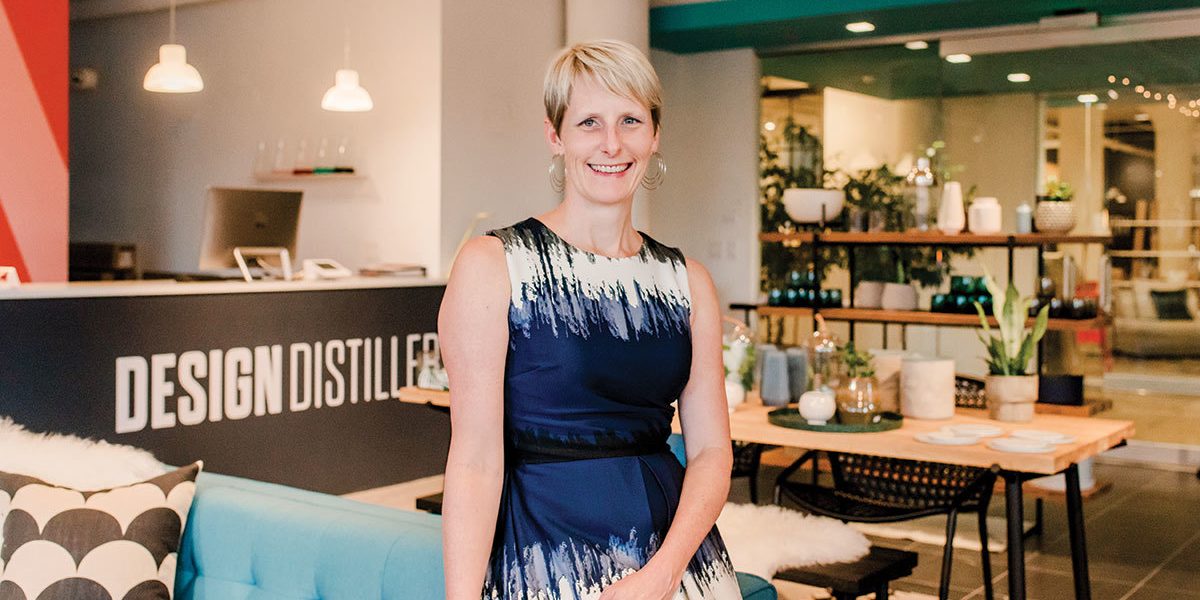Home & Living
Design Distillery Sells Decor Ideal for the Baltimore Rowhome
The new Federal Hill space is larger, but its modern furniture isn’t.
When it comes to interior design and home furnishings, Charm City was, for a long time, a pretty conservative town, its aesthetic rooted in 300 years of European tradition. But you won’t find much of what the antique dealers call “brown furniture” at Design Distillery’s newish Federal Hill space.
Instead, there’s a live-edge dining table shorn from the trunk of an acacia tree, and owner Karen Graveline’s current favorite, a black homage to the Windsor chair with a curved spindle back, molded from plastic. Then there are bar stools, bedside tables, and tufted sofas with clean lines and slender legs, all in an array of colors from turquoise and cocoa to beige.
What you won’t find here is the stuff your parents are pushing on you: the carved mahogany sideboards, bedroom sets in turned walnut, or the dining-room table with extra leaves—which speaks to the current dictum, “Your kids don’t want your brown furniture.”
With designs inspired by 20th-century icons Eero Saarinen, Harry Bertoia, and Florence Knoll, the showroom houses staged vignettes showing clean, airy living spaces with soft shag rugs and arched matte-black floor lamps.
“Our roots are in modernism,” says Graveline, who recently rebranded the business she started as Home on the Harbor in 2002. “It’s really about design that is functional, simple, and sustainable.”
Graveline, who grew up in a modern house in Montgomery County, learned to love design from her architect father. The family attended Orioles games in the city, and, as they made their way through Baltimore neighborhoods to Memorial Stadium, Graveline loved seeing people sitting on their stoops and decided she wanted to live here. Graveline studied interior design at University of Maryland but became a graphic designer. When she and her engineer husband, Stanley, bought a rowhouse near Riverside Park, she says, “That’s when I got interested in furniture again.”
She would buy mid-century modern castoffs from auctions and estate sales to fix up and sell at the Antique Center at Federal Hill. Then, when she and Stanley saw a store (with an apartment upstairs) for rent in the neighborhood, they decided to give retail a go, opening Home on the Harbor in 2002 with a unique niche—smaller, modern pieces made to scale.
But in a country of giant rooms and giant furniture, they had some ’splainin’ to do. “Back then,” she says, “people didn’t know what to make of us. So I said, ‘It fits in rowhouses.’” That, she says, became the hook: “furniture that fits.”
A couple of years later, she opened a second store in Mt. Washington, then relocated to a repurposed industrial space in 2010, and doubled the store’s size to 9,500 square feet in 2016, while also renaming the business.
When she’s choosing furniture for the store, Graveline has an important requirement: “I have to picture it in a Baltimore home.” While, at one time, that simply meant a sofa had to fit through the narrow door of a Federal Hill rowhouse, she has refined the notion over the years. “Baltimore wants proven design,” she says, but nothing too fussy. “Baltimore tends to be informal.”
